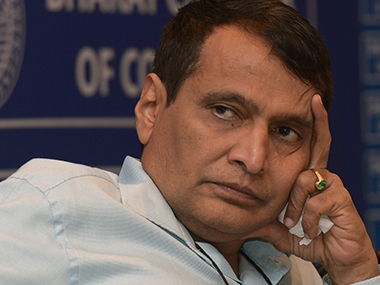Delegates from as many as 52 countries, including the United States and China, participated in
an informal meeting of the WTO held in New Delhi on Tuesday, amid increasing protectionism in global trade and talks of undermining the organisation by western democracies. Responding to a question on whether the World Trade Organisation (WTO) was dead, a high ranking Indian delegate participating in the informal meeting said: “WTO is on the death bed and in the ICU… we are trying hard to revive it but the big and powerful (the European Union and the United States) want it to be dead. (They want to) replace it with something new, which can dance along with them and make a fool of the third world countries… again.” A press release issued by the Indian ministry of trade saying “delegates will explore in detail the option for reinvigorating the WTO”, seems to confirm this view. [caption id=“attachment_4181211” align=“alignleft” width=“380”] File image of commerce minister Suresh Prabhu. AFP[/caption] A hint of this sense of doom was evident in the concluding remark of India’s Commerce Minister Suresh Prabhu. “It is a collective responsibility of the WTO members to address the challenges facing the system and putting it back on a steady and meaningful way forward so that it continues to serve the people of our countries,” said Prabhu. During the meeting, United States deputy trade negotiator Dennis Shea and European Commission director-general Jean-Luc Demarty heard the arguments of other countries but gave no commitment on issues like agriculture, fisheries, subsidies, domestic regulation in services of the EU and the US affecting India and others. All member states targeted the United States and President Donald Trump and took Shea to task for
unilaterally increasing the tariffs on steel and aluminium beyond the commitments in WTO. The western democracies (the US and EU) which founded the WTO have used it as a tool to open market access to the third world while blocking access to their own markets – by using the non-tariff barriers and unattainable quality standards. Now, third world countries like India and China seem to have understood the game plan. With new laws and rules for quality standards and non-tariff barriers, they too have started protecting their own markets; thus, winning the game of trade for which the rules and regulations where made by the “intelligent” and “clever white” men. The US and EU are not implementing the decisions taken at the previous ministerial meeting by changing their stand on all issues and have been trying to browbeat India and the least developed countries. The statement issued by Prime Minister Narendra Modi’s office after the meeting said: “He (Modi) noted that decisions taken in the Doha Round and Bali ministerial meeting are yet to be implemented. He re-emphasised on the need for a compassionate approach towards the least developed countries.” The United States now wants the rules and the regulation of trade changed again as the third world counties have understood and mastered them, and are beating the first world countries at their own game. “They want to change all old rules and regulations of the dispute resolution mechanism made by themselves as these (rules and regulations) are now working against them in the tribunals,” a delegate from one of the least developed countries said on the condition of anonymity. The appellate tribunal of the WTO, which had been giving landmarks judgments against the EU and the US has become defunct as Washington has blocked the appointment of new judges with the help of EU and wants its own men in the tribunal to get favourable judgments. Modi, in his statement, “reiterated India’s commitment to a rule-based multilateral trading system, based on the principles of inclusiveness and consensus. He said that a robust conflict resolution mechanism is one of the key benefits of the WTO.” As the US, along with the EU, move ahead to kill and bury the multilateral forum that is WTO and go back to the old days of arm-twisting bilateral negotiations, the Trump administration is expected to announce this weekend a further hike in tariffs unilaterally on more items, thus further undermining the WTO. Responding to a Firstpost question as to why not bury the dead WTO and start a new organisation with a new set of rules and regulation, the Director-General of WTO Roberto Azevedo said: “The system (WTO) is working and I have not heard that the US is walking out (of WTO)… However, they (the US) think the world has changed a lot… that the WTO needs to be updated in certain areas.” What are those updates… reforms? “Those kinds of things we don’t know… we are now beginning to have a conversation and members all want reforms to improve the system, but we don’t know what they are and what kind of outcome that is going to have,” Azevedo said. The author tweets @kjsingh001
On the face of it, it appears that the Union Minister of Commerce and Industry Suresh Prabhu has failed miserably to revive the WTO.
Advertisement
End of Article


)

)
)
)
)
)
)
)
)



